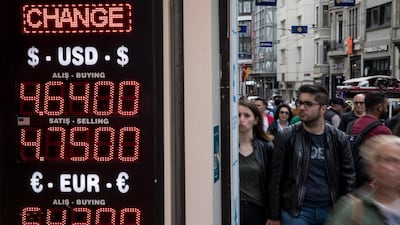In many ways the story of the last month has been the weakness of emerging markets, with Turkey and Argentina being in the spotlight due to the idiosyncratic responses of their governments to pressures on currencies, but with a more general theme also playing out as higher US interest rates, a stronger dollar and firmer oil prices threaten capital flows to those countries with large deficits, high inflation and reliance on foreign funding.
After outperforming global equity markets for the last two years, emerging market equities have underperformed since the start of 2018. The MSCI EM index has dropped -1.9 per cent year-to-date (ytd) compared to a +0.4 per cent ytd gain in the MSCI World index, and since the start of second quarter of 2018, the MSCI EM index has dropped -2.9 per cent compared to a gain of +2.1 per cent in the MSCI World index.
A recent report by the ratings agency Fitch highlighted that EM debt securities have ballooned to $19.3 trillion from $5tn a decade ago, with China apparently accounting for more than half of this increase, but with the Ukraine, Turkey and Argentina being cited as "the most vulnerable".
Approximately two-thirds of this EM debt is also dollar denominated making it particularly problematic at a time of dollar strength and rising US rates.
Argentina raised interest rates four times in less than a month to 40 per cent as the government tried to halt currency depreciation, contributing to a 56 basis point (bps) increase in 10-year Argentine government bond yields to 7.29 per cent.
In Turkey, the lira had been getting close to a rate of 5.00 to the US dollar on May 23 before the central bank intervened and implemented an emergency 300bps hike to its late liquidity window– its monetary policy tool of choice – taking it to 16.50 per cent.
________________
Read more:
Oil set for best weekly winning streak since 2011 after hitting the $80 mark
IMF's Christine Lagarde: Turkey central bank must stay independent
________________
This followed remarks from President Recep Tayyip Erdogan that should he win the snap election he called in April next month, he would assume greater control over monetary policy. Having previously declared himself as an enemy of high rates, believing that they in fact fuel inflation, sentiment towards the Turkish lira recovered a little following the rate hike.
Some further more placatory statements from President Erdogan also helped, pledging that Turkey had the means to stabilise the currency in the short term. He also talked about how new measures to reduce inflation and narrow the current account deficit would be adopted after the June 24 elections, which he is likely to win. Much will now depend on what those new measures turn out to be.
Unnervingly, the market pressure is not only confined to emerging markets, as Italy and Spain are increasingly coming under scrutiny due to largely domestic political reasons, but also against a backdrop of weak macro fundamentals and historic structural problems. The new Italian coalition government is pushing for debt relief on its national debt which is 130 per cent of gross domestic product, while at the same time promising to increase fiscal spending that could see the country's debt burden rise to closer to 160 per cent of GDP.
At the same time the formation of that government is also being threatened by its choices for key cabinet posts, with its nomination for finance minister an avowed Euro-sceptic.
Spain’s government is also facing a risk of collapse, with the main opposition party calling for a vote of no confidence in the minority rule of Mariano Rajoy, whose centre-right Popular party has been plagued by a campaign finance scandal. Spain’s fundamentals are firmer than Italy’s, however, with nominal GDP growth stronger and with its debt burden under greater control following cuts to it fiscal deficit in recent years.
None of Spain’s main political parties are Euro-sceptic either, but the situation does remind about how sensitive markets can be to political risks, particularly in countries with such uneven track records of economic management, and at a time when fragility in one of its key eurozone partners is also being exposed.
The euro fell to its lowest level against the dollar in six months last Friday, below 1.17, with demand for "core" government debt in the US, UK and Germany being preferred over peripheral debt.
However, with global events, over trade tariffs and geopolitical issues again starting to cast a shadow over some of these evolving regional and emerging market themes, it may not be long before they are amplified by risks of a much greater international nature and significance.
Tim Fox is chief economist and head of research at Emirates NBD


